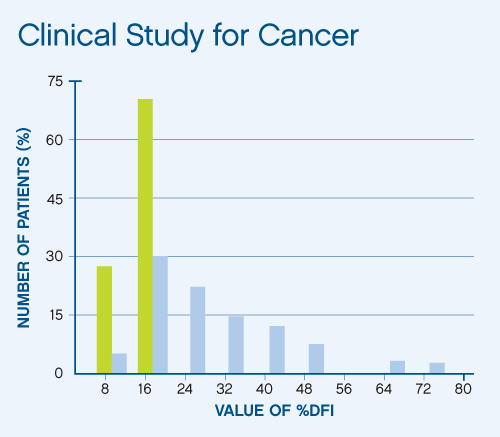Cancer
Cancer often causes temporary to permanent male infertility, most likely from both the disease and the drug therapies used to treat the disease, which have been found to damage sperm DNA and elevate DFI levels. However, the disease itself often damages sperm DNA. Thus, the general practice of collecting semen sample for freezing upon diagnosis of cancer is a good policy; however, the semen quality is often compromised prior to therapy. Therefore, at a time when the cancer patient is recovering from treatment it is often a question of whether the sperm DNA is a higher quality in the pre-treatment sample or the sample following recovery.
In general, men with good DNA integrity prior to chemotherapy have better DNA integrity recovery after chemotherapy than those with poor DNA integrity prior to chemotherapy. Patients with testicular, Hodgkin's disease, non-Hodgkin's disease and other neoplasm's (abnormal growth, i.e. tumor) were evaluated with SCSA analysis. The results showed the cancer patients as a group had significantly higher DNA damage when compared to proven fertile donors (Kobayashi et al. 2001).
 Distribution of individual %DFI values. Cross-hatched bars,18 samples from healthy semen donors; solid bars, 39 semen samples from patients with testicular cancer after unilateral orchiectomy before further treatment. From Fossa et al 1997.
Distribution of individual %DFI values. Cross-hatched bars,18 samples from healthy semen donors; solid bars, 39 semen samples from patients with testicular cancer after unilateral orchiectomy before further treatment. From Fossa et al 1997.
In another study, semen from six men with acute lymphocytic leukemia was analyzed for DNA fragmentation 10 to 52 months after completion of therapy. All men had DNA fragmentation consistent with a normal fertile reproductive status. After treatment one patient fathered a normal child and a second fathered a child with multiple congenital malformations followed by a second normal child (Evenson et al. 1984).
Patients with testicular cancer were evaluated by SCSA after unilateral orchiectomy (removal of one testis) but before treatment. Twenty-three of the thirty-nine patients displayed abnormal DNA fragmentation during pre-treatment. After treatment with radiotherapy or chemotherapy in 19 returning patients, recovery of spermatogenesis was seen in 4 out of 5 patients and was observed more in patients with normal DNA fragmentation during pre-treatment (Fossa et al. 1997).
 PATIENT INFORMATION
PATIENT INFORMATION CLINIC INFORMATION
CLINIC INFORMATION

